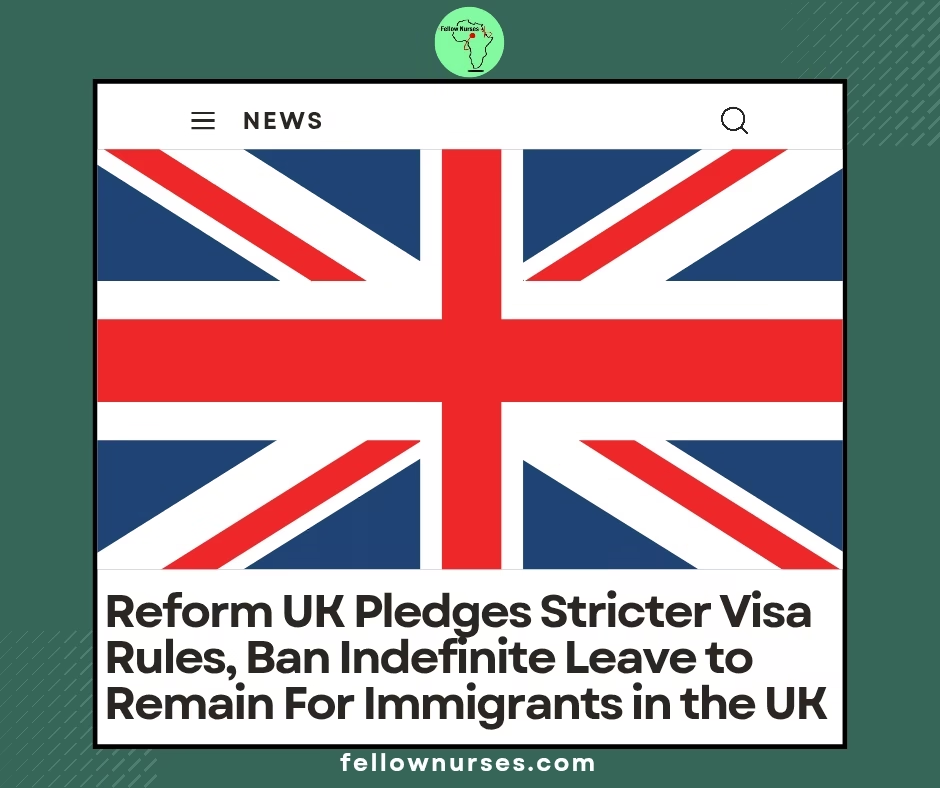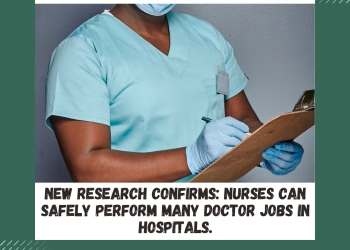Fellow Nurses Africa News, September 23, 2025 – London, UK

Reform UK, led by Nigel Farage, has ignited a firestorm of concern within the UK’s healthcare community with its September 22, 2025, announcement to abolish Indefinite Leave to Remain (ILR), a critical pathway to permanent residency for many immigrant nurses, doctors, and other healthcare professionals. The party’s proposal would replace ILR with renewable five-year visas, imposing higher salary thresholds, stricter English language requirements, and restricted access to NHS services and welfare benefits for non-citizens.
Notably, the plan would apply retrospectively, potentially affecting existing ILR holders, though EU citizens with settled status under the EU Settlement Scheme are expected to be exempt. This proposal follows the Labour government’s earlier May 2025 Immigration White Paper, which suggested extending the ILR qualifying period from five to ten years for most work-based visa routes, a plan that already sparked significant unease among migrant healthcare workers.
The NHS, where non-UK nationals constitute approximately 35% of doctors and 27% of nurses, faces heightened risks from Reform’s policy, which could exacerbate existing staffing shortages. The British Medical Association (BMA) and Royal College of Nursing (RCN) have warned that such measures could destabilize the healthcare system, with England already grappling with deficits of over 12,000 doctors and 50,000 nurses. Many of these professionals, particularly from nations like Nigeria, India, and the Philippines, have been instrumental in sustaining the NHS, with international recruitment accounting for 95% of the previous government’s pledge to deliver “50,000 more nurses.”
Farage defended the policy, arguing it would align the UK with countries prioritizing their citizens and curb perceived welfare system abuse. Deputy leader Richard Tice emphasized economic benefits, claiming potential savings of £234 billion, though these figures have been contested by the Centre for Policy Studies and the Office for Budget Responsibility. Critics, including Labour MP Nadia Whittome, have labeled the proposal “cruel and unjust,” warning of its potential to disrupt lives and critical sectors like healthcare. The3million, an advocacy group for EU citizens, noted initial fears among its members, alleviated only by the clarification of exemptions for settled status holders.
This proposal comes on the heels of the Labour government’s earlier May 2025 White Paper, which proposed extending the ILR qualifying period to ten years for most work-based visa routes, such as Skilled Worker and Health & Care Worker visas, while retaining the five-year pathway for family routes. Titled “Restoring Control Over the Immigration System,” the White Paper introduced an “earned settlement” model, allowing migrants making “meaningful contributions” to potentially qualify for ILR sooner, though specific criteria remain undefined pending public consultation scheduled for later in 2025. The plan also included tighter English language requirements (B2 level for settlement), higher salary thresholds, and a phased closure of some Health & Care Worker visa routes by 2029. This earlier proposal triggered significant opposition, with two e-petitions—one for Skilled Worker visa holders and another for Hong Kong BN(O) visa holders—each surpassing 100,000 signatures, prompting a Westminster Hall debate on September 11, 2025. Minister for Border Security and Asylum Alex Norris confirmed the 10-year baseline but emphasized that final details would await consultation outcomes.
The combined impact of Labour’s 10-year ILR proposal and Reform UK’s more drastic abolition plan has heightened anxiety among migrant healthcare workers. The RCN has warned that both policies could lead to significant staff losses, particularly among nurses, at a time when the NHS is already strained. NHS Employers noted that recent visa restrictions on care workers have already hampered recruitment, and further changes could jeopardize patient care by lengthening waiting lists. Immigration experts have also raised concerns about potential legal challenges, particularly regarding retrospective changes to existing visa holders’ rights.
The Labour government, under Prime Minister Keir Starmer, has distanced itself from Reform UK’s proposal, reaffirming its commitment to maintaining ILR while refining its own 10-year pathway through consultation. However, ongoing reliance on international recruitment, coupled with recent freezes on funding for British nurse training, underscores the critical role of migrant healthcare professionals. As Reform UK gains traction in polls ahead of the next election, expected by 2029, the debate over ILR continues to spotlight the invaluable contributions of nurses and doctors from Africa and beyond, who remain integral to the NHS’s resilience.
Fellow Nurses Africa is the independent voice of African Nurses. We educate, inform and support the nursing profession.










